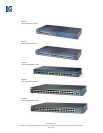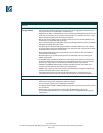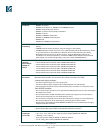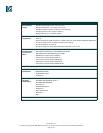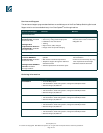
Cisco Systems, Inc.
All contents are Copyright © 1992–2003 Cisco Systems, Inc. All rights reserved. Important Notices and Privacy Statement.
Page 3 of 15
These switches provide customers with many connectivity and port-density options. The Cisco Catalyst 2950-12
and Cisco Catalyst 2950-24 switches provide 12 and 24 10/100-Mbps ports, respectively, for edge connectivity.
Depending on port-density requirements, customers with gigabit fiber uplink connectivity needs can choose between
the Cisco Catalyst 2950SX-24 Switch, which provides 24 10/100-Mbps ports and 2 integrated 1000BASE-SX ports,
and the Cisco Catalyst 2950SX-48 Switch, which provides 48 10/100-Mbps ports and 2 integrated 1000BASE-SX
ports.
With these integrated ports, customers get an extremely cost-effective solution for delivering gigabit speeds using
fiber. These switches are ideal for education and government segments where fiber uplinks are required. For
customers that do not need fiber connectivity, the Cisco Catalyst 2950T-48 Switch with 48 10/100-Mbps ports and
two integrated 10/100/1000 BASE-T ports is a cost-effective alternative. The 10/100/1000 BASE-T ports can be used
for server connectivity or for uplink connectivity to distribution or other switches. Dual ports also provide
redundancy and increased availability, as well as provide a cost-effective means for cascading switches and managing
them as a cluster. The Cisco Catalyst 2950 Series Intelligent Ethernet switches with Enhanced Image software are
fixed-configuration models that bring intelligent services, such as advanced QoS, enhanced security, and high
availability to the network edge while maintaining the simplicity of traditional LAN switching. Combining a
Cisco Catalyst 2950 Series Intelligent Ethernet Switch with a Cisco Catalyst 3550 Series Switch enables IP routing
from the edge to the core of the network. Refer to the Cisco Catalyst 2950 Series Enhanced Image Data Sheet for
more information:
http://www.cisco.com/en/US/partner/products/hw/switches/ps628/products_data_sheet09186a00801a0c5b.html
Network Availability with Wire-Speed Performance in Connecting End Stations
to the LAN
With a switching fabric of 13.6 Gbps and a maximum forwarding bandwidth of 13.6 Gbps, Cisco Catalyst 2950
Series switches deliver wire-speed performance on all ports in connecting end stations and users to the company
LAN. Cisco Catalyst 2950 Series switches with basic services support performance-boosting features such as Cisco
Fast EtherChannel
®
to provide high-performance bandwidth between Cisco Catalyst switches, routers, and servers.
Network Security
Cisco Catalyst 2950 Series switches offer enhanced data security through a wide range of security features. These
features allow customers to provide network security based on users or MAC addresses. The security enhancements
are available free by downloading the latest software for the Cisco Catalyst 2950 Series switches.
Private VLAN Edge isolates ports on a switch, ensuring that traffic travels directly from the entry point to the
aggregation device through a virtual path and cannot be directed to another port. In addition, for authentication
of users with a TACACS+ or a RADIUS server, 802.1x provides port-level security. Simple Network Management
Protocol Version 3 (SNMPv3) (non-crypto) monitors and controls network devices as well as manages
configurations, performance, collection of statistics, and security.
With the Cisco Catalyst 2950SX-48, 2950T-48, 2950SX-24, 2950-24, and 2950-12 switches, network managers can
make ports and consoles highly secure. MAC-address-based port-level security prevents unauthorized stations from
accessing the switch. Multilevel access security on the switch console and the Web management interface prevents
unauthorized users from accessing or altering switch configurations and can be implemented using an internal user
database on each switch or a centrally administered TACACS+ or RADIUS server. Using 802.1x in conjunction with




